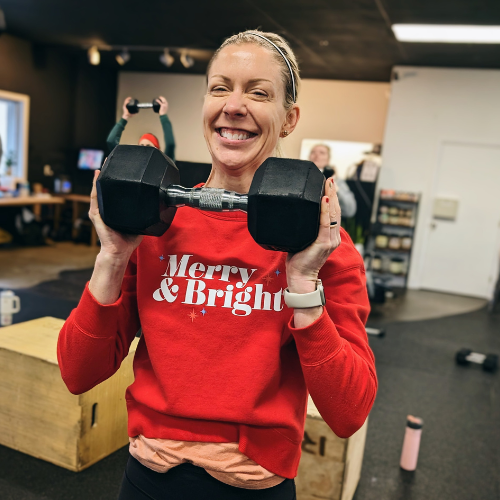How To Avoid Progress Frustration
And what to track more than the scales.
I've been there. Unmet expectations hurt. You start with big dreams, yet weeks and even months later, frustration creeps in. You feel like you failed. You don't want to talk about it. Sound familiar? It's all too common in the gym and with fitness. I chat with clients all the time who feel like they aren't getting the results they are working so hard for. They've set specific and SMART goals. They show up pretty regularly and really work hard!
I've a firm believer in setting goals and working hard. But I've come to understand that while setting goals and plans are super important, accomplishing them is more of a "maybe I'll accomplish them maybe I won't" thing. It's the goal that puts us on the right path to building the better habits and putting in the work for the life we want. However, it's what we learn along the way and who we get to do it with that matters most. And not losing sight of what we ultimately want to accomplish.
What we want to accomplish and what we specify as our goal are often two different things. And that's what I want to talk about today as you think about starting new habits and routines in 2025.
Why Your Goals Matter
Goals are the lighthouse in your fitness storm. However, you don't actually want to get to the lighthouse but to the shore, or port right..? That’s where the problem often begins. As a beginner in fitness, being so focused on a specific goal can actually lead to a crash against the rocks.
Your goals matter in the sense that they provide motivation and a tangible result or accomplishment. They help keep you showing up day after day. But they are just a guide in the long term plan.
I'll say here too that for more experienced athletes, specific goals and a plan become important to push through plateaus and to improve performance. But that comes later.
The Common Cycle of Disappointment
- You set a SMART goal.
- You chase it with all you’ve got.
- You realize it’s too far out of reach.
- You quit—discouraged, deflated, and feeling worse than before.
We’ve all been there. But there’s a better way.
How to Break the Cycle
Think about what you want AFTER you've accomplished your goals. Some things I hear regularly from 30-40 year old moms in their free intro sessions is "I want to just feel like I'm taking care of myself again", and "I want to feel stronger and more confident". Dads often say they want to "be more active with their kids", or "feel athletic again".
Then what you do is measure your progress against those things rather than against the scales.
- Do you feel more energized with your kids?
- Do you feel proud about showing up consistently?
- What have you learned about strength training?
- Do you feel more comfortable in the gym or class?
- Do you feel stronger and more capable?
- What other habits have changed as a result?
These questions are what you should be asking for the first 6-12 months. After you've been in a routine and the necessary habits for a while where training has become a part of who you are and what you do, when you are less likely to quit after not losing 30 pounds, that's when the magic begins to happen. Sure, many clients lose 20-30 pounds in a year but they've followed this thought process of focusing on the long term and making it a part of their daily routine NO MATTER the timeline of their specific goals.
What To Measure Instead
Instead of watching only the scales, measure these things instead for the first 12 months.
- Self confidence. When you increase self confidence, you are more likely to make better decisions in so many areas.
- Functional movement. Moving well is a huge part of success inside and out of the gym.
- Learning good form. Strength training is key to so many things and good form is key to strength training.
- Is it fun? If you're not having fun it's so much harder to progress.
- Are you challenging yourself in new ways?
- Sleep. How is sleep improving?
- Mood. How is your mood when you're with other people? How is your mental health?
- Nutrition habits. If you don't feel like you're making progress don't throw everything away. Nutrition is the foundation. Go there and make a change.
There's a lot more to think about too but if you measure these things for the first 12 months you will check off so many goals you didn't even know you had and you will avoid the frustration that so many people give into after only 2-3 months.
Ready to get started with a long term plan that will have you feeling better, fitter than you've ever been, and looking your best? You can fill out this form to get in touch with me and schedule a FREE INTRO SESSION.







